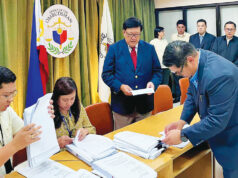Marcos calls for unity and cooperation in climate action

PHILIPPINE President Ferdinand R. Marcos, Jr. on Wednesday called for effective communication to raise awareness about the impact of climate change.
He made the call at the 16th Annual Global Warming and Climate Change Consciousness Week.
“I enjoin the Climate Change Commission to effectively communicate this year’s theme of unity and cooperation for a more resilient and adaptable nation,” he said.
He said rising temperatures, extreme weather events and the deteriorating biodiversity are “stark reminders of the need to quickly respond to this immediate environmental concern.”
“We all have a role to play in this mission. So we must work together, take a stance in support of our planet,” he said. “Let us be involved in creating solutions to mitigate the effects of global warming and climate change.”
Mr. Marcos said in his first address to Congress that he will work towards a shift to green energy and boost investment in climate-resilient infrastructure.
Despite his climate talks, the Philippine leader, who is pressured by civil society to go beyond green rhetoric, has yet to declare a national climate emergency, which would authorize the government to mobilize funds to step up climate mitigation efforts.
The US has yet to declare a climate emergency and neither has China. They accounted for 41.89% and 34.75% of world gross domestic product in nominal and purchasing power parity terms, respectively, in 2021.
A measure seeking a national declaration is gaining traction at the House of Representatives after it hurdled second reading approval on Wednesday.
Cagayan de Oro City Rep. Rufus B. Rodriguez said the proposed Climate Change Resilience Act would call on the government to craft measures that would address human-caused global warming and mobilize funds for mitigation efforts.
The measure proposes the creation of a Climate Change Resiliency Adaptability Program.
“Extreme weather conditions have devastated and may continue to devastate parts of the country, which shall radically impact and affect the country’s food production and supply, water availability, public health, infrastructure, and economy,” the bill’s author said. “Thus, there is a need for additional measures to mitigate the effects of climate change.” — Kyle Aristophere T. Atienza



